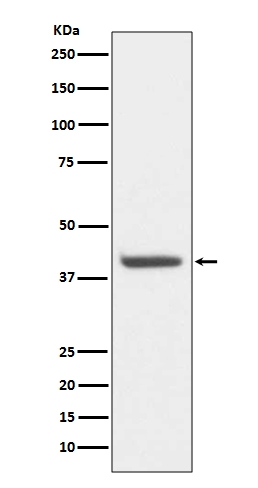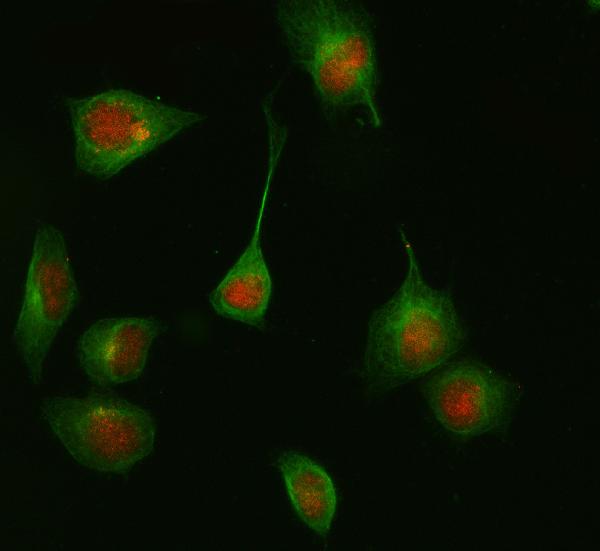Anti-HDAC8/Histone Deacetylase 8 Rabbit Monoclonal Antibody
- SPECIFICATION
- CITATIONS
- PROTOCOLS
- BACKGROUND

Application
| WB, IF, ICC, IP, FC |
|---|---|
| Primary Accession | Q9BY41 |
| Host | Rabbit |
| Isotype | Rabbit IgG |
| Reactivity | Rat, Human, Mouse |
| Clonality | Monoclonal |
| Format | Liquid |
| Description | Anti-HDAC8/Histone Deacetylase 8 Rabbit Monoclonal Antibody . Tested in WB, ICC/IF, IP, Flow Cytometry applications. This antibody reacts with Human, Mouse, Rat. |
| Gene ID | 55869 |
|---|---|
| Other Names | Histone deacetylase 8, HD8, 3.5.1.98, Protein deacetylase HDAC8, 3.5.1.-, Protein decrotonylase HDAC8, 3.5.1.-, HDAC8 {ECO:0000303|PubMed:10926844, ECO:0000312|HGNC:HGNC:13315} |
| Calculated MW | 41758 MW KDa |
| Application Details | WB 1:5000-1:20000 ICC/IF 1:50-1:200 IP 1:50 FC 1:50 |
| Subcellular Localization | Nucleus. Cytoplasm. Excluded from the nucleoli. Found in the cytoplasm of cells showing smooth muscle differentiation. |
| Tissue Specificity | Weakly expressed in most tissues. Expressed at higher level in heart, brain, kidney and pancreas and also in liver, lung, placenta, prostate and kidney.. |
| Contents | Rabbit IgG in phosphate buffered saline, pH 7.4, 150mM NaCl, 0.02% sodium azide and 50% glycerol, 0.4-0.5mg/ml BSA. |
| Clone Names | Clone: HGO-8 |
| Immunogen | A synthesized peptide derived from human HDAC8 |
| Purification | Affinity-chromatography |
| Storage | Store at -20°C for one year. For short term storage and frequent use, store at 4°C for up to one month. Avoid repeated freeze-thaw cycles. |
| Name | HDAC8 {ECO:0000303|PubMed:10926844, ECO:0000312|HGNC:HGNC:13315} |
|---|---|
| Function | Histone deacetylase that catalyzes the deacetylation of lysine residues on the N-terminal part of the core histones (H2A, H2B, H3 and H4) (PubMed:10748112, PubMed:10922473, PubMed:10926844, PubMed:14701748, PubMed:28497810). Histone deacetylation gives a tag for epigenetic repression and plays an important role in transcriptional regulation, cell cycle progression and developmental events (PubMed:10748112, PubMed:10922473, PubMed:10926844, PubMed:14701748). Histone deacetylases act via the formation of large multiprotein complexes (PubMed:10748112, PubMed:10922473, PubMed:10926844, PubMed:14701748). Also involved in the deacetylation of cohesin complex protein SMC3 regulating release of cohesin complexes from chromatin (PubMed:22885700). May play a role in smooth muscle cell contractility (PubMed:15772115). In addition to protein deacetylase activity, also has protein-lysine deacylase activity: acts as a protein decrotonylase by mediating decrotonylation ((2E)-butenoyl) of histones (PubMed:28497810). |
| Cellular Location | Nucleus. Chromosome Cytoplasm Note=Excluded from the nucleoli (PubMed:10748112). Found in the cytoplasm of cells showing smooth muscle differentiation (PubMed:15772115, PubMed:16538051). |
| Tissue Location | Weakly expressed in most tissues. Expressed at higher level in heart, brain, kidney and pancreas and also in liver, lung, placenta, prostate and kidney. |

Thousands of laboratories across the world have published research that depended on the performance of antibodies from Abcepta to advance their research. Check out links to articles that cite our products in major peer-reviewed journals, organized by research category.
info@abcepta.com, and receive a free "I Love Antibodies" mug.
Provided below are standard protocols that you may find useful for product applications.
If you have used an Abcepta product and would like to share how it has performed, please click on the "Submit Review" button and provide the requested information. Our staff will examine and post your review and contact you if needed.
If you have any additional inquiries please email technical services at tech@abcepta.com.













 Foundational characteristics of cancer include proliferation, angiogenesis, migration, evasion of apoptosis, and cellular immortality. Find key markers for these cellular processes and antibodies to detect them.
Foundational characteristics of cancer include proliferation, angiogenesis, migration, evasion of apoptosis, and cellular immortality. Find key markers for these cellular processes and antibodies to detect them. The SUMOplot™ Analysis Program predicts and scores sumoylation sites in your protein. SUMOylation is a post-translational modification involved in various cellular processes, such as nuclear-cytosolic transport, transcriptional regulation, apoptosis, protein stability, response to stress, and progression through the cell cycle.
The SUMOplot™ Analysis Program predicts and scores sumoylation sites in your protein. SUMOylation is a post-translational modification involved in various cellular processes, such as nuclear-cytosolic transport, transcriptional regulation, apoptosis, protein stability, response to stress, and progression through the cell cycle. The Autophagy Receptor Motif Plotter predicts and scores autophagy receptor binding sites in your protein. Identifying proteins connected to this pathway is critical to understanding the role of autophagy in physiological as well as pathological processes such as development, differentiation, neurodegenerative diseases, stress, infection, and cancer.
The Autophagy Receptor Motif Plotter predicts and scores autophagy receptor binding sites in your protein. Identifying proteins connected to this pathway is critical to understanding the role of autophagy in physiological as well as pathological processes such as development, differentiation, neurodegenerative diseases, stress, infection, and cancer.



